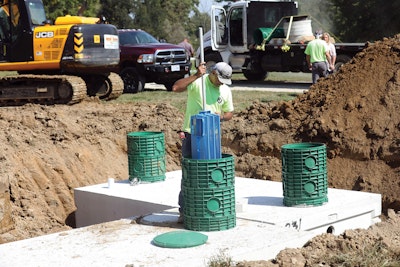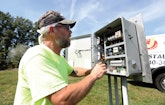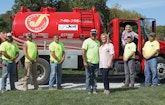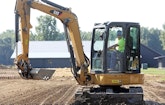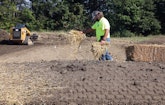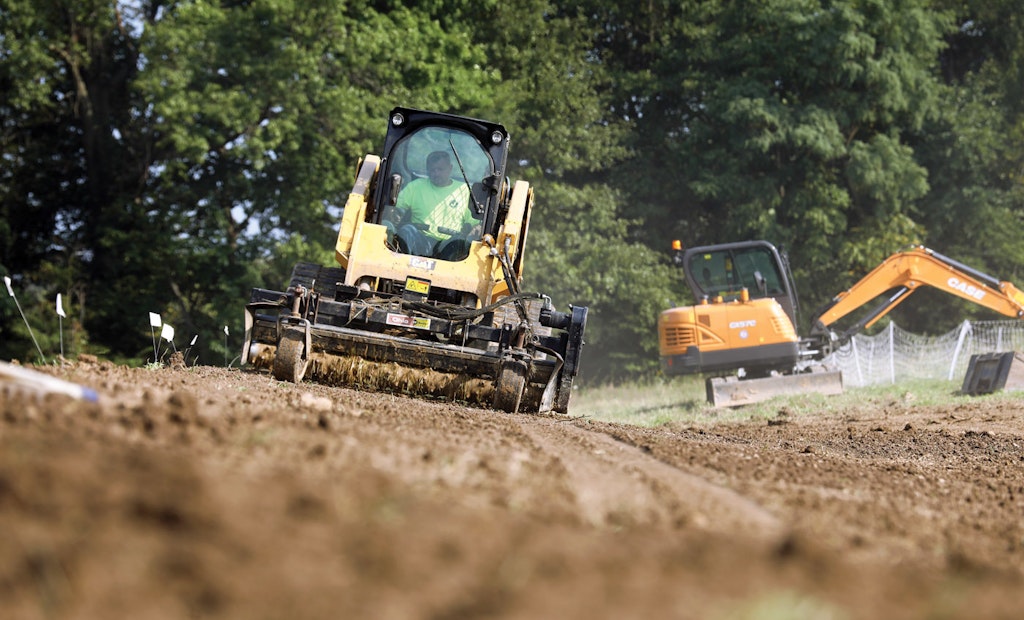
John White, Jack’s Septic supervisor, uses a Cat 279 track loader with a rake to finish grading a mound while installing a septic system.
“I always wanted to own my own business, even as a kid. I had no idea how. There was no master plan, but I always had that bug that I wanted to work for myself,” Manuel “Manny” Diaz says.
It took a few years, but now he does own one — Jack’s Septic of Newark, Ohio. Diaz was born in Cuba and came to freedom in the United States as a child in a large emigration of people disenchanted with the regime of Fidel Castro.
In the spring of 1980, people who wanted to leave the island began flocking to the Peruvian Embassy in Havana. When the crowd seeking asylum reached about 10,000, the Cuban government ceased trying to keep people on the island. A fleet of private boats, many sailed by Cuban-Americans, crossed more than 100 miles of ocean from the Florida Keys to Cuba and brought thousands of refugees to U.S. soil in what became known as the Mariel boatlift. Among them was a 12-year-old boy named Manny Diaz.
His parents found work running a cattle ranch in Florida, and that’s where Diaz learned to handle equipment, starting with a backhoe attached to the rear of an old Ford tractor. Then he went on to work in the citrus industry. He helped developed land for citrus groves, in the process learning how to run heavy equipment. After that, he installed irrigation systems for large growers.
“The drip irrigation we used in the ’80s and ’90s is basically the same technology we use now in wastewater,” Diaz says.
He met his wife, Kelli Diaz, at a quarter-horse show. They both showed horses nationally. Together they worked for huge citrus corporations, and while the pay was good, there was still that itch to own his own business.
Kelli Diaz had grown up in Ohio, and they moved there from Florida. The plan was for Manny Diaz to take over her father’s restaurants.
“But he didn’t like being inside. It wasn’t a good fit for him,” Kelli Diaz says.
Jack, the namesake of their business, was one of her father’s friends.
“Before buying Jack’s I had never messed with wastewater. But I had installed millions of feet of irrigation pipe, so I wondered, how hard can it be?” Manny Diaz says.
OHIO RULES
It is a bit different, and that has been changed by state rules for onsite systems. Ohio’s new rules took effect in 2015, and Diaz has seen a positive result.
“Since the rules changed and we started doing mandatory soil testing, we find a lot fewer systems failing prematurely,” he says.
About 80 percent of the systems they install now use some kind of pretreatment, typically one of the aerated systems from Jet Inc., and some kind of modified drainfield. For example, his technicians use Infiltrator Water Technologies chambers, but due to the soil’s limiting conditions, the trenches may only be in the ground 3 to 4 inches. These raised leachfields are not as involved of a design as a Wisconsin mound system, but it does mean building the drainfield above grade.
“Installing the system is only half the job. Sometimes we have to move 200 or 300 tons of topsoil to cover it,” Diaz says.
The dripline he learned to install in Florida is still used, but not often. Jack’s Septic technicians may install about a half-dozen systems per year that use it.
Although many of the company’s jobs are residential, they do take on large commercial jobs occasionally. A local private campground, for example, was expanding by 24 sites. Technicians from Jack’s Septic put in a collector system with laterals to each campsite to collect the wastewater and move it to the central treatment system.
The only real obstacle for installing the system was weather. It was scheduled for a March installation, but there was so much rain that the project ran about a month behind.
“I think the most we worked in a stretch was three consecutive days. We would work, and then it would rain, and we would have to pull out and wait for the site to dry out,” Diaz says.
EQUIPMENT CORNER
Although the crew at Jack’s Septic does quite a bit, they do it without a lot of equipment. The current fleet consists of:
- 2007 International vacuum truck built by House of Imports with a 2,500-gallon steel tank and National Vacuum Equipment pump
- Two track loaders: a 2014 Cat 279D and a 2017 Case TR340
- Three excavators: a 2018 Case CX57C, a 2012 Cat 305, and a 2006 Kobelco SR50
- 2016 Sure-Trac tilt trailer
- 2017 Sure-Trac tilt trailer
- 2018 CAM Superline tilt trailer
- 2015 Rice Trailer Deckover equipment trailer
- 2016 Dodge 5500 with a service body
- 2008 Dodge 3500 flatbed
- 2016 Dodge 3500
- 2016 Ford van service truck
- 1996 single-axle International dump truck.
The dump truck is mainly used on site to move material around. “I can get material hauled cheaper than if I buy it and haul it myself, so I’ve never been a fan of owning a bunch of trucks,” Diaz says.
He also has a wide range of attachments for the track loaders, which are used to clear land, finish grade, and anything in between. He doesn’t have a camera — yet. Cleaning drains is not something he’s been interested in, but he is listening to his customers, and they have been making more requests for the service, so it’s likely he will add that piece of equipment and service in the near future.
PEOPLE MAKE THE DIFFERENCE
On the operating end of those machines is a crew of technicians that Diaz says is great. There is turnover in the position of vacuum truck driver because of heavy demand in his area for CDL drivers.
“There have been times we hired people without any experience, but if they have the right values and work hard, Manny will teach them what they need to know,” Kelli Diaz says.
The grandson of Jack, from whom Manny Diaz bought the company, also came in with no prior experience and now has his CDL and is operating equipment.
Employees receive a competitive wage, bonuses, paid vacation and a block of time off they can use as they wish. It’s called paid time off in many companies, and it means the time is unassigned. How it is used — whether for vacation or sickness — is up to the employee. Because they believe in family, the company will work with employees who want to meet those obligations, Kelli Diaz says.
Unlike many small companies they also offer health insurance. Diaz says it took her about a month to find a plan that worked.
“It is a big expense, especially because we’re a small company, but health insurance is important,” she says.
To keep those people working, Manny Diaz depends primarily on reputation.
“Our company has a great reputation, and I think that’s what makes the phone ring,” he says.
There are a lot of repeat customers and referrals. Diaz’s keys to keeping that sort of customer satisfaction are simple.
“I treat everybody as I would want to be treated,” he says. “Basically, you do what you say you’re going to do when you say you’re going to.”
He’s a stickler for returning phone calls on the same day they come in, but he admits this has become harder to do because the company is picking up so much work.
The last key is doing great work. It’s easy to be the low bidder, he says.
“We’re definitely not the cheapest. We’re from the middle to the higher end of the price bracket. But when we do something, we’re going to stand behind it, and you can rest assured it is done right.” The company offers a five-year warranty on workmanship, but in the 17 years he has owned the company, he cannot recall a time when it was needed.
SMALL COMPANY, BIG RESULTS
The commercial systems installed by Jack’s Septic tend to be large. For example, they installed an onsite system for the Bo Jackson’s Elite Sports complex in Columbus. The sports centers — named for Bo Jackson who played baseball for the Kansas City Royals and football for the Raiders — train children in athletics. While the complex in Columbus is scheduled for a sewer connection in the next few years, in the meantime it needed a system capable of handling the wastewater generated by several thousand people each week.
Most of their business comes from the four counties that contain Columbus and its suburbs. In the last three to five years, there has been a lot of commercial construction — a distribution center for Amazon, a large building for Facebook, and a large building for Victoria’s Secret. All those companies have employees whose houses may need onsite systems. About 65 percent of company business is new construction and the rest is some type of repair, he says.
In 2012 they bought the service department of another company, and that came with a database of 10,000 customers. Most of those people renew their two-year ATU maintenance contracts with Jack’s Septic.
The company installs about 125 systems annually, Kelli Diaz says. It pumps 800 to 1,000 tanks and services about 1,200 to 1,500 systems. Jack’s Septic is also a distributor and service provider for Jet Inc.
“And that’s with two office staff, one pump truck, one service truck and one construction crew,” she says. “That just shows what great employees we have.”
When Manny and Kelli Diaz took over the business, they knew they wanted to expand it. Jack’s Septic had operated primarily in one county.
“So we bought the business not only for what he had, but what it could become,” Manny Diaz says.
Diaz thinks about the future, and he is careful about committing to too much expansion because he wants his company to survive. But the most important point about the future is that he has one. That was not necessarily true for people who did not cross the 125 miles of ocean between the Florida Keys and Mariel, Cuba, almost 40 years ago.
“I want to make sure people understand the opportunities we have in this country. I get really upset when I hear somebody bad-mouthing the United States or saying the American dream is gone. I’m living proof: If you want to work, it’s here. And this is the greatest country in the world, bar none. I don’t want to make it a political thing, but I’m a big believer in that,” Diaz says.
Cash is king
When Manuel “Manny” Diaz looks to the future of Jack’s Septic in Newark, Ohio, he sees opportunities, but he also imposes his own limits.
Trenchless technology interests him. It would be useful in installations, and it would also give the company another service and revenue stream in case onsite work slows down. But those machines cost money, and that’s where his self-limiting comes in.
“The easiest thing now is to go to the bank and get another loan,” he says. He doesn’t want to do that. His goal is to grow at the speed of cash. He doesn’t have credit cards for his business, and he doesn’t carry a lot of debt.
The building boom of the early 2000s was much like now, with installers able to put in three systems a week in his part of the country. But when the recession came, it was hard to sustain that amount of work. The big companies were the first to go down because they were overextended, Diaz says.
There are other factors in his hesitation. The company is small now, and although Diaz would like to expand, he doesn’t want to lose the small-company feel and advantages.
“Plus, I like to be involved too much. I love being out on the jobs, not in the office,” he says.
